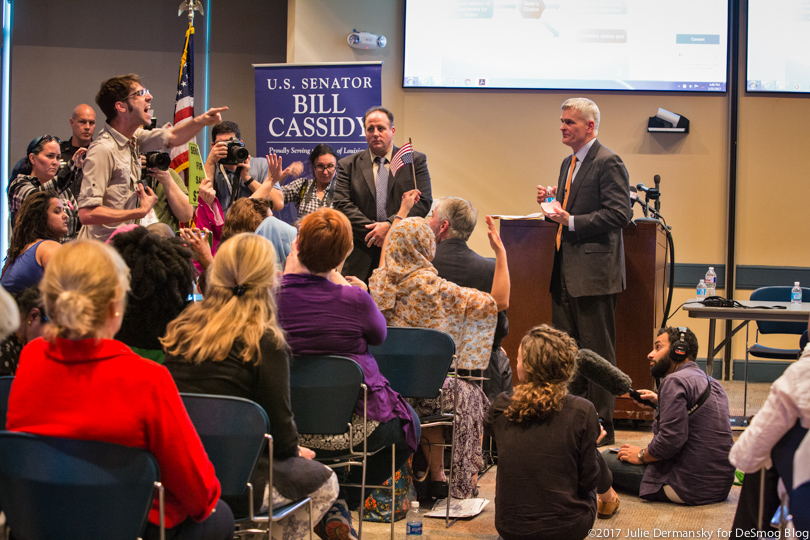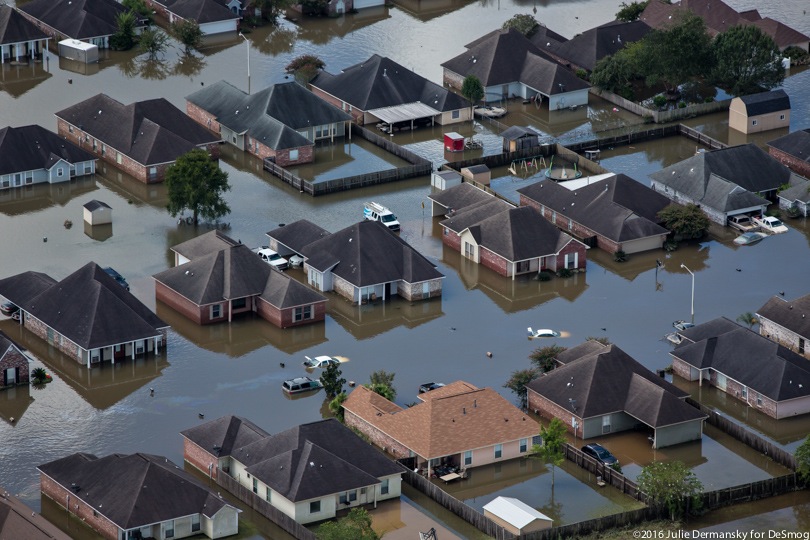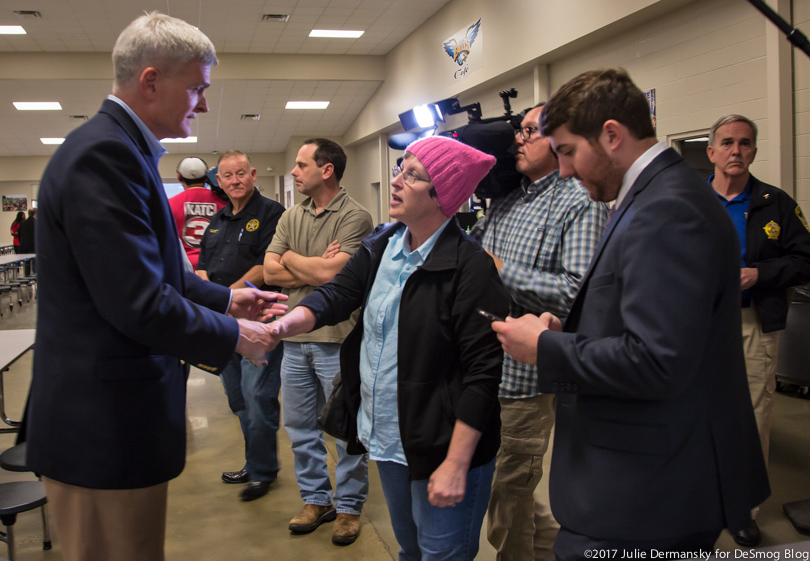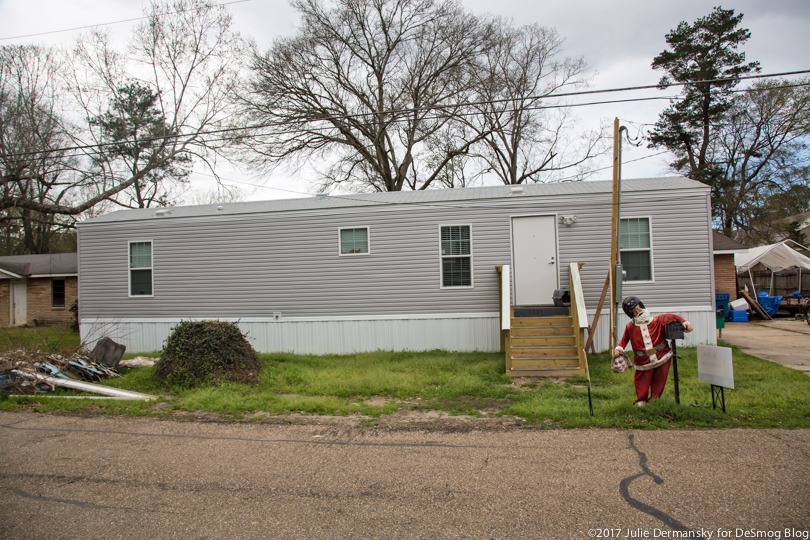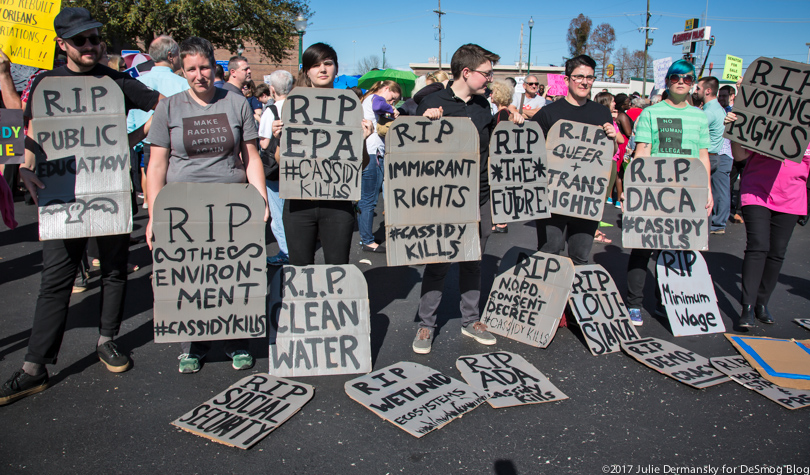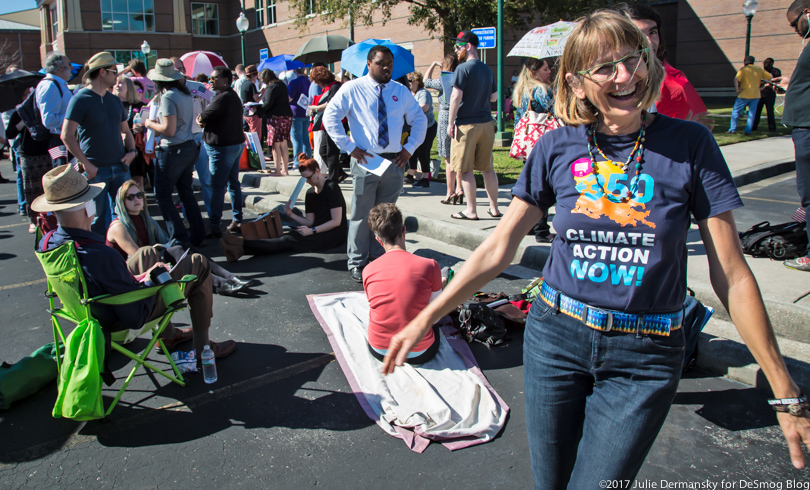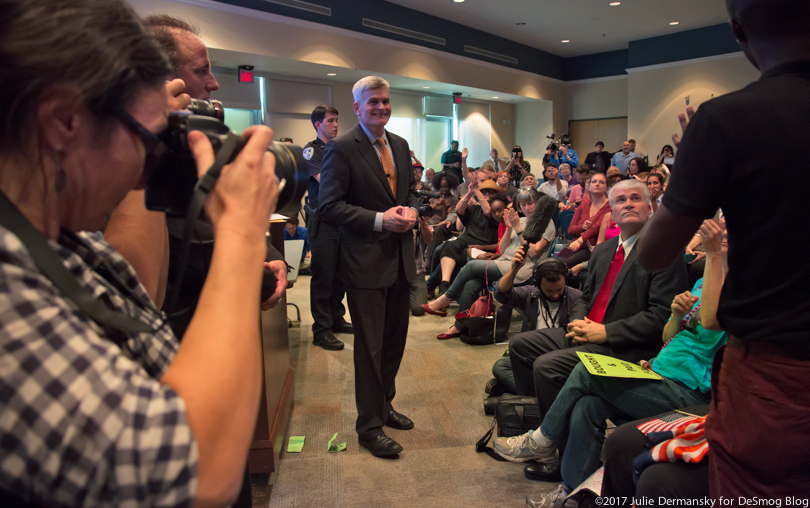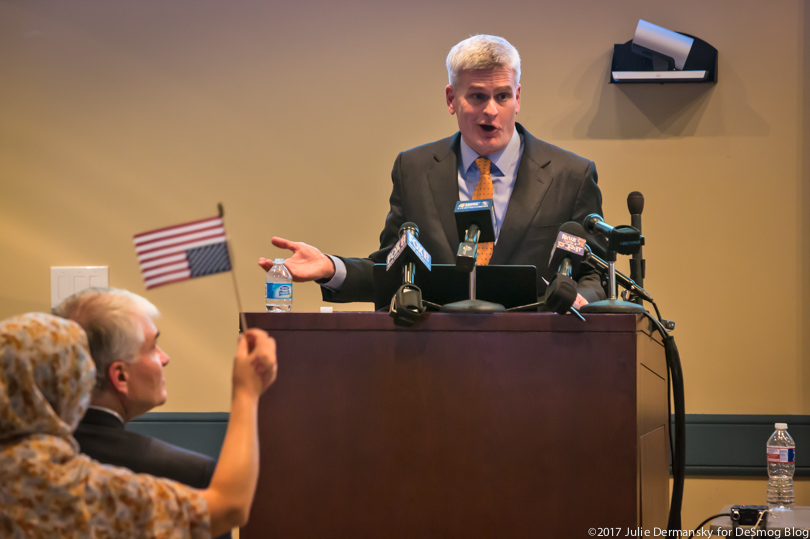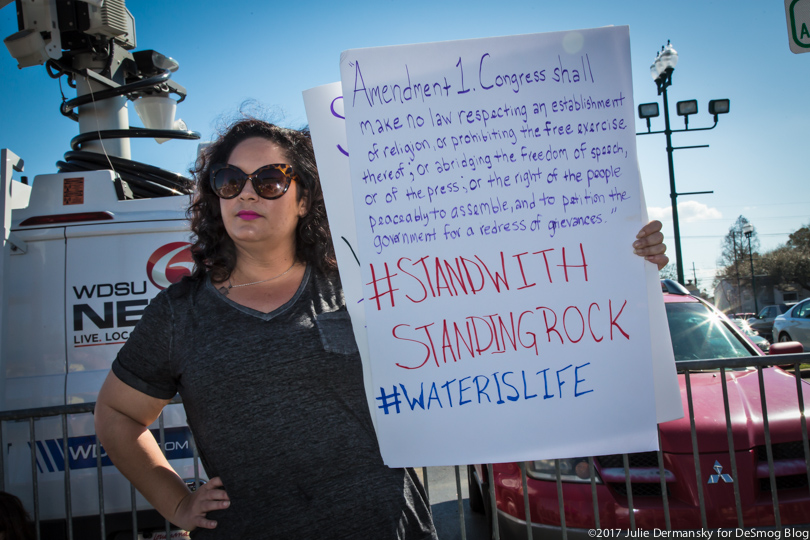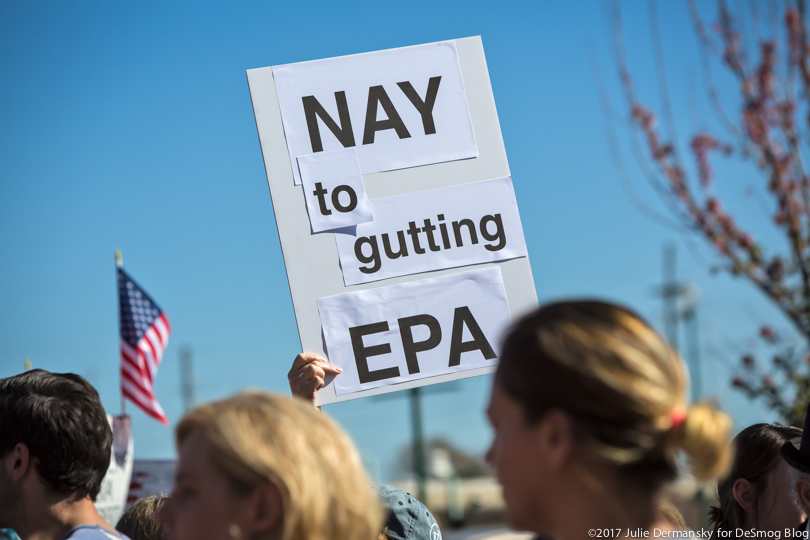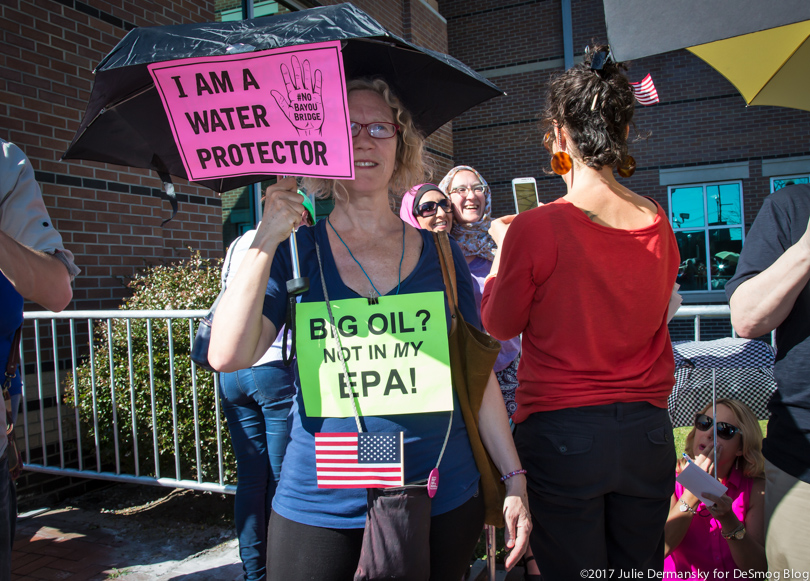Louisiana Senator Bill Cassidy’s constituents packed emotionally charged town hall meetings across the state during Congress’ February break, a trend seen in other meetings with lawmakers around the country.
At Sen. Cassidy’s first town hall in Denham Springs, which was ground zero for the 1,000 year flood that devastated parts of southern Louisiana last year, the senator focused on flood recovery efforts.
While Sen. Cassidy mentioned that lowering greenhouse gas emissions would “theoretically” be good for sea level rise, he failed to connect climate change to the region’s extreme floods. Instead, he praised President Donald Trump’s goals of bringing back manufacturing jobs to the United States, which could then be powered by the nation’s natural gas reserves.
Aerial view of 2016 flooding in Livingston Parish, the Louisiana parish in which Sen. Cassidy’s first of five town halls was held during the February 2017 Congressional recess.
“If President Trump is successful in having industry move back to the United States, using our natural gas, renewables, and nuclear instead of China’s coal, that will dramatically decrease global greenhouse gas emissions,“ Cassidy said.
Cassidy’s statements mirror former President Obama’s claim that natural gas is a “bridge fuel” to cleaner energy sources, but evidence shows that natural gas production has a significant impact on the environment and is not a clean energy source.
Instead, leaking methane from natural gas development adds more climate pollution to the mix. The Obama administration passed the Methane Waste and Prevention Rule in November 2016 to reduce methane emissions from the oil and gas industry, but Congress is in the process of rolling back the new rule.
“Clearly the United States has made great efforts to decrease greenhouse gas emissions,” Sen. Cassidy said, but instead went on to cite success in curtailing the air pollutants from power plants and vehicles that lead to smog and acid rain, as required by the Clean Air Act. He made sure to point out that China does not have the same kind of protections, and its power plants continue to spew out pollutants.
Environmental groups, such as the Sierra Club, have expressed disappointment that Sen. Cassidy and Pres. Trump are encouraging further development of the fossil fuel industry.
“We agree that America must invest in jobs and combat climate change, but, rather than doubling down on dirty fossil fuels that will only exacerbate climate change, we should continue the investment in the fastest growing energy job market, clean, renewable energy,” Melinda Pierce, Sierra Club’s legislative director, told DeSmog in an email. “Countries around the globe — including China — have made massive investments in this energy, while Cassidy and Trump continue to stand against clean energy jobs and climate action at every turn.”
Sen. Cassidy talking to a worried constituent after the meeting who thanked him for taking questions from those who oppose his views.
Cassidy on Climate Change
After his first public meeting, I asked Sen. Cassidy if he thought humans played a role in climate change. Instead of answering my question, he spoke about the unfair global marketplace resulting from China not having to abide by the same rules as other countries, insisting China “makes almost no effort” to limit air pollutants, specifically sulfur dioxide and nitrogen oxides, from coal power plants.
(While it continues to struggle with air quality, China plans to cap its coal consumption by 2020, and is making great strides with solar energy, doubling its solar power capacity in 2016.)
Each time I asked about climate change, Sen. Cassidy answered instead with a reference to sulfur dioxide and nitrogen oxides as if they were the top greenhouse gases contributing to current climate change rather than carbon dioxide and methane.
In Denham Springs, Louisiana, on Feb. 21, 2017, a FEMA trailer sits in front of a home that has not been restored since the 1,000 year flood the previous August.
Sen. Cassidy was one of the seven senators who asked the Federal Emergency Management Agency (FEMA) to reconsider a new rule requiring states to address climate change in disaster planning and preparedness as a condition for federal disaster mitigation grants. A letter they sent to FEMA states: “When it comes to the relationship between climate change and extreme weather events, there remains to be any indication or trend to show there have been increases in their occurrence or intensity.”
In the letter, the senators went on to write that there are growing doubts about the conclusiveness of scientific research linking human activities to a warming climate and tying climate change to more severe weather. However, climate experts overwhelmingly recognize that humans are changing the climate and these changes are increasing the likelihood of extreme weather, from floods and hurricanes to heat waves and drought.
The crowd of protesters outside Sen. Cassidy’s town hall in Metairie, Louisiana.
Renate Heurich of the organization 350 outside Sen. Cassidy’s town hall meeting in Metairie, Louisiana.
Renate Heurich, an organizer with the climate advocacy group 350, was disturbed that Sen. Cassidy still refuses to acknowledge humans’ role in climate change. “It is unfathomable that Cassidy, a medical doctor, can’t make a clear statement about the human impact on climate change, which is increasingly careening out of control,” she told DeSmog.
“A medical doctor also has the scientific training needed to evaluate scientific data on climate change. My only explanation is willful ignorance and cowardice so he can fit in line with his GOP colleagues.
Sen. Cassidy, inside a town hall meeting at a public library in Metairie, Louisiana.
Though signs were forbidden in the town hall meetings, some snuck some in under the radar.
In Metairie, Louisiana, a suburb of New Orleans, only a small fraction of those who showed up to Sen. Cassidy’s second town hall meeting could get into a public library room with a capacity for just over 200 people. As the meeting was coming to a close, Sen. Cassidy tried to bring up climate change, but the crowd led him back toward the topics of health care and education.
Sen. Cassidy having fun with the crowd in Metairie, Louisiana, which often was so loud that he couldn’t speak.
Questioning Whether Trump’s EPA Will Protect Vulnerable Communities
Sen. Cassidy took questions from the press after both meetings. I pointed out that the Louisiana Environmental Action Network (LEAN) has had to sue the Environmental Protection Agency (EPA) to compel it to enforce regulations in the past. How would Louisiana fenceline communities fare under EPA administrator Scott Pruitt‘s leadership? He expressed confidence that the EPA would continue enforcing existing regulations.
LEAN‘s director, Marylee Orr, affirmed that over the last thirty years her organization has had to “use petitions and lawsuits to get the agency to act on regulations or get them to move forward on an issue that was affecting a community.”
Many LEAN members live in fenceline communities, neighborhoods that border refineries and other industrial sites. “They are deeply concerned that the EPA’s new administrator has sued the agency 13 times on behalf of an oil and gas company,” Orr said. “It is no secret the Mr. Pruitt championed the rights of ExxonMobil Corporation.”
“Senator Cassidy assures us there will be oversight, but when is the last time he convened a hearing about the EPA’s enforcement of environmental laws?” Ann Rolfes, director of the Louisiana Bucket Brigade, asked.
“He is sorely out of touch not only with his constituents, but also with his own neighbors in Baton Rouge. It would take him 15 minutes to cross town and meet people who live with serious air pollution every day. These people are sick from Exxon and Honeywell’s pollution. As a physician and a human being he should take the situation seriously, and not pretend that EPA is helping them.”
Protester outside Sen. Cassidy’s town hall meeting in Metairie, Louisiana.
Protester outside Sen. Cassidy’s town hall with sign expressing concern about the potential gutting of the EPA by the Trump administration.
An activist identifying as a “water protector,” as inspired by the Standing Rock Sioux Tribe against the Dakota Access pipeline, stands outside Sen. Cassidy’s town hall in Metairie, Louisiana.
Main image: Louisiana Sen. Cassidy holds a town hall meeting with constituents in Metairie, a suburb of New Orleans.
Subscribe to our newsletter
Stay up to date with DeSmog news and alerts


